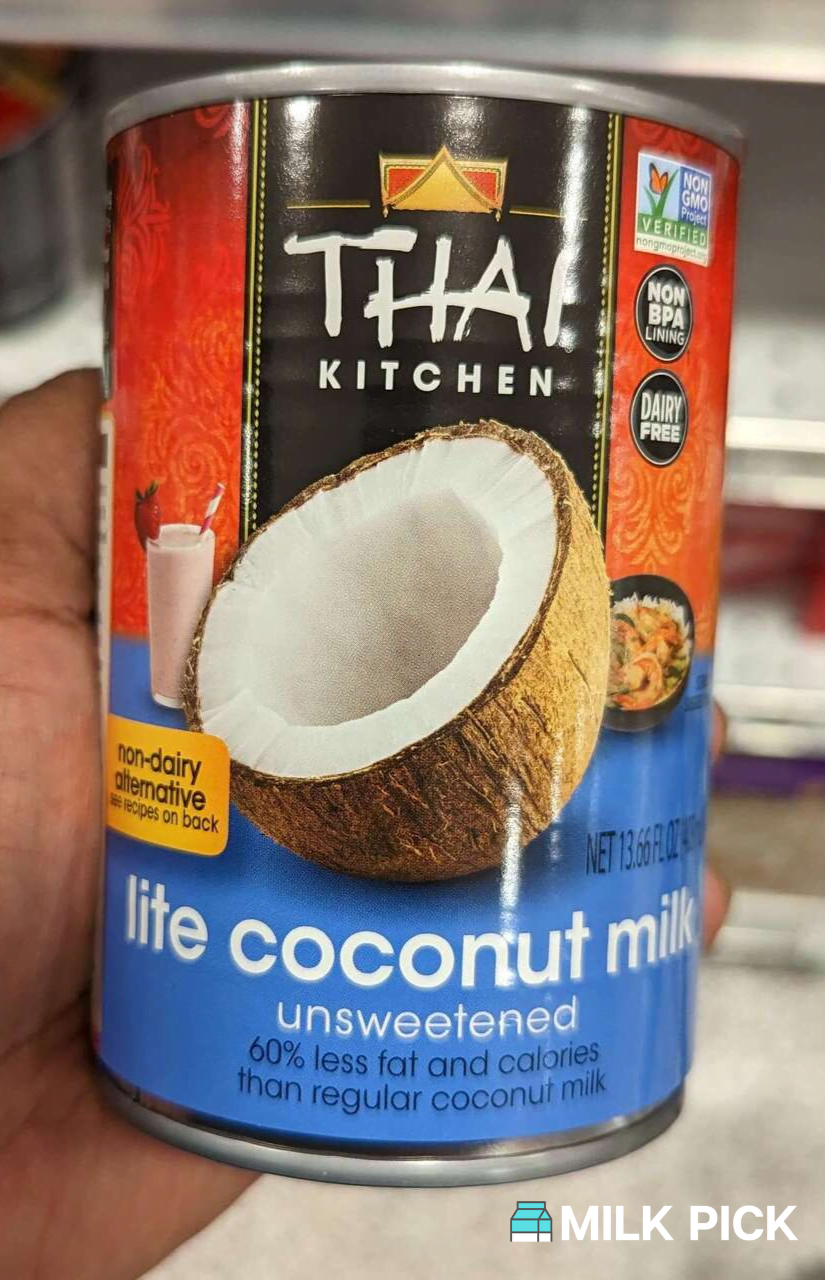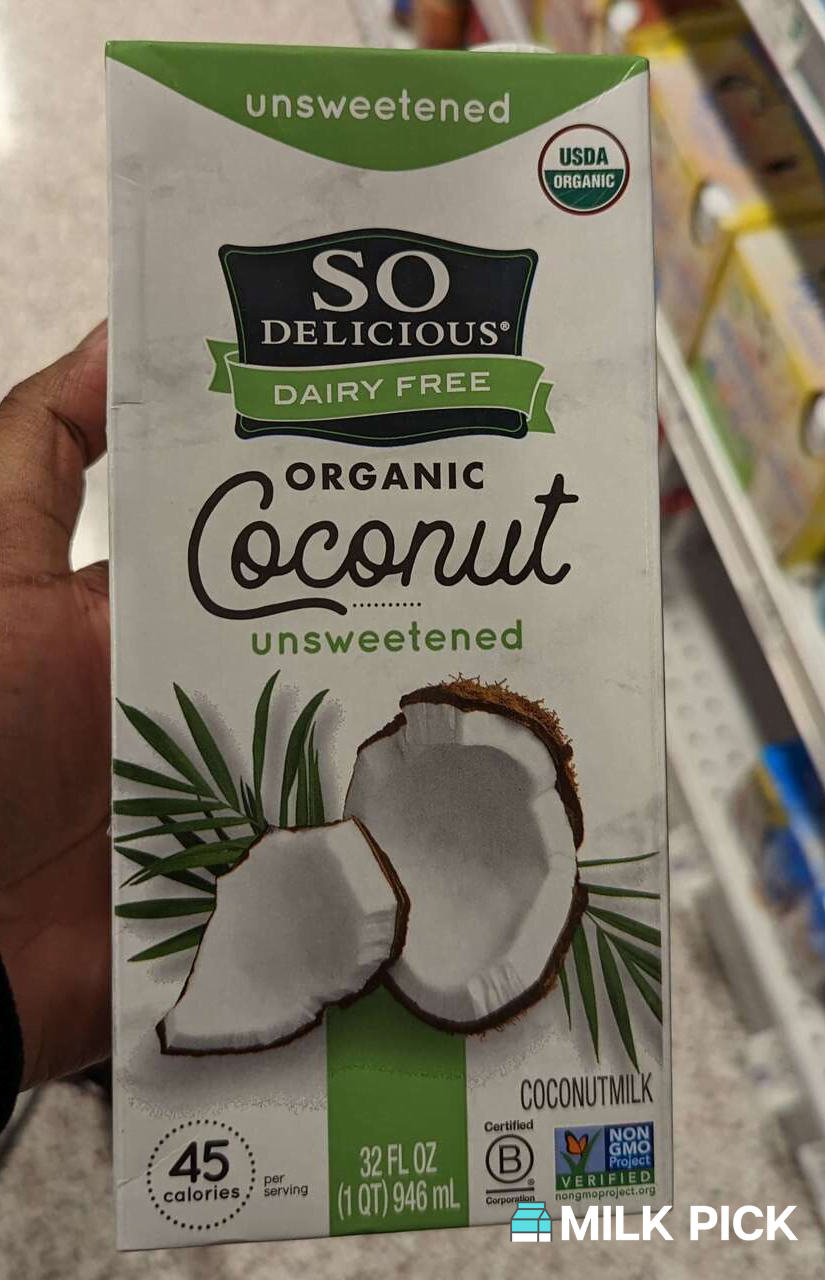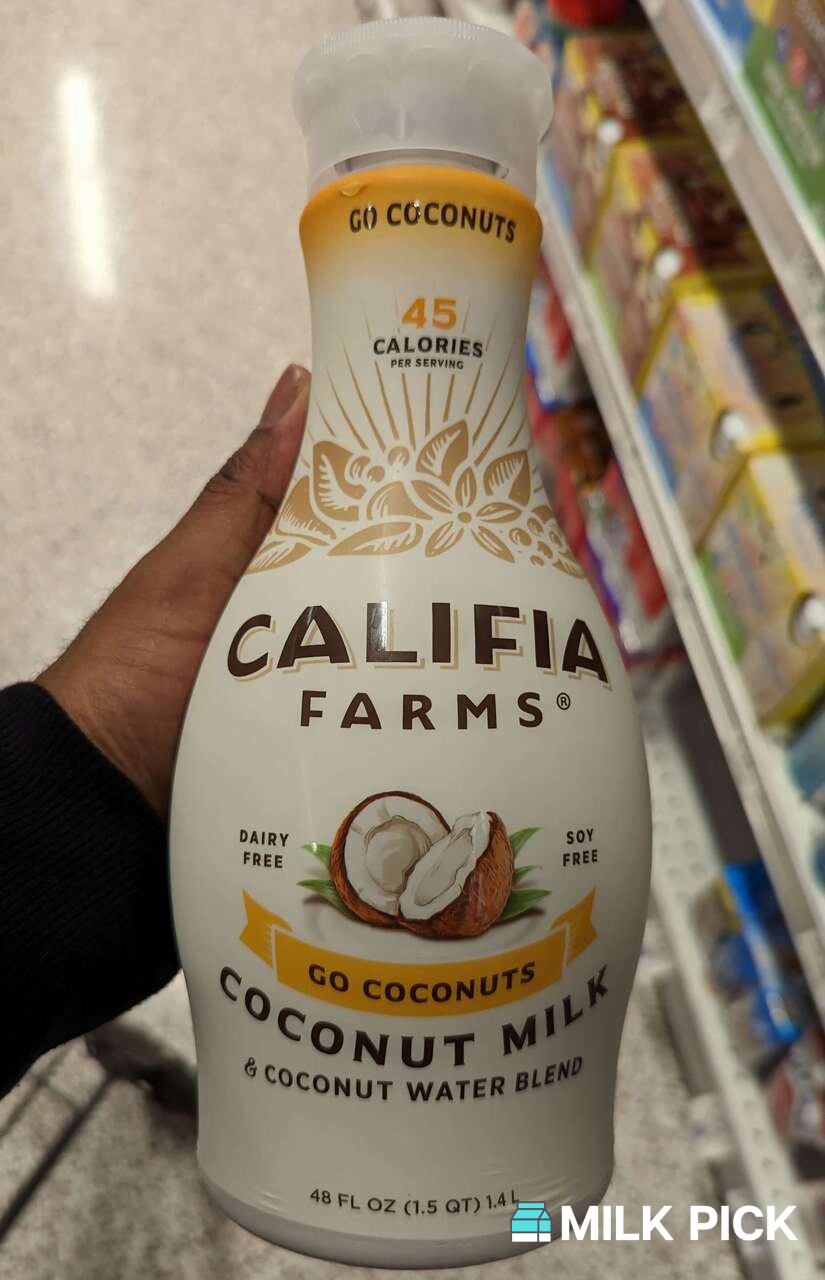Coconut milk is a popular plant-based liquid often used in South American, Southeast Asian, and Caribbean dishes.
The beverage gives dishes like curries and stews a tropical, sweet note, and it’s also used in many dairy-free and vegan recipes as a substitute for regular milk.
While coconut milk is ideal for those following a plant-based diet, it has more calories and fat than some other dairy-free alternatives.
Its unique flavor can also clash with other elements in dishes. These characteristics can lead to the need for a coconut milk substitute for some uses.
However, it's not as simple as swapping any milk you have in your fridge. Choosing the best coconut milk substitute depends largely on the dish you're making, flavor preference, and other factors.
But not to worry. We've broken down how to choose the best dairy-free substitute for coconut milk for any dish!
What is Coconut Milk?
Coconut milk is a plant-based beverage made from grated coconut flesh.
The milky-white substance extracted from the coconut meat is combined with water to create a creamy, coconut-flavored liquid.
To make coconut milk, shredded or grated coconut flesh is soaked in hot water. Then, the mixture is strained using a cheesecloth or fine sieve.
You can make coconut by hand, but manufacturers use machinery that handles the shredded and expelling process, which results in a rich, creamy product.
If you want to nerd out even more on coconut milk, I highly recommend watching our coconut milk 101 video!
Different Types of Coconut Milk
You may see different types of coconut milk at the grocery store, including canned coconut milk, hermetically sealed shelf-stable coconut milk, and refrigerated coconut milk.
Canned Coconut Milk
Canned coconut milk is a popular option for cooking and baking.
This type of coconut milk contains coconut cream (coconut milk made by simmering coconut meat in water and then letting it cool and solidify) and water in a shelf-stable 14-ounce can.
Canned coconut milk is creamy and rich and works well in desserts, soups, and curries.
The cream portion can also be used to mimic dairy-based heavy cream.

Shelf-Stable Coconut Milk
Also known as Ultra-high-temperature (UHT coconut milk), shelf-stable coconut milk is pasteurized coconut milk stored at room temperature in a hermetically sealed package.

This allows the product to last without refrigeration for several months. Check out this article to learn more about shelf-stable milk.
You can also watch our short Instagram video on the topic.
This type of coconut milk is much thinner than the canned version and works well as a milk substitute.
Refrigerated Coconut Milk
Refrigerated coconut milk is a dairy-replacement beverage found in the refrigerated aisle of the grocery store.
This type of coconut milk is typically sold in cartons or bottles, and sold as a coconut beverage.
It is similar in consistency to shelf-stable varieties, has a milder coconut flavor, and works well as a dairy milk substitute.

7 Best Substitutes For Coconut Milk
While coconut milk is a delicious alternative to dairy milk, you may wish to substitute it in specific recipes or avoid it altogether.
For example, coconut milk is not an ideal plant-based alternative if you have a coconut allergy (like 0.5-1% of the population) or follow a low-fat diet.
Additionally, if you don’t like the taste of coconut, you might wish to use a different type of dairy-free milk to get the same consistency in a recipe.
You can opt for another non-dairy milk substitute for coconut milk in most recipes.
Below are some of our favorite non-dairy substitutes for coconut milk that you can use in various ways to achieve similar tastes, textures, and flavors:
1. Oat Milk
Oat milk is a plant-based alternative to dairy milk. It’s made by blending whole oats with water, then straining the mixture to remove any solid particles. This leaves behind a creamy white liquid resembling dairy milk.
Oat milk has a mild flavor and slightly fewer calories and fat than refrigerated coconut milk.
For example, oat milk has 120 calories, 5 grams of fat, and 3 grams of protein, while refrigerated coconut milk has 150 calories, 15 grams of fat, and 2 grams of protein.
This makes it a great substitute for limiting your calorie or fat intake.
However, oat milk is higher in carbohydrates and sugars than coconut milk (around 16 grams of carbs to 2 grams of carbohydrates), so it may not be ideal for people with diabetes or who are on keto and want to avoid sugars.
Oat milk is much less thick than canned coconut milk but slightly creamier than most refrigerated coconut milk options.
This makes it an excellent 1:1 substitute for recipes that use light coconut milk or don’t rely on the flavor of coconut, such as baked foods or smoothies.
2. Soy Milk
Soy milk is a long-standing replacement beverage for dairy, and it works well as a coconut milk substitute.
Soy milk is made by blending soybeans and water, then straining any remaining solids.
It's low in calories and fat and relatively high in protein, making it a suitable coconut milk replacement for those who want to mimic the nutritional profile of dairy milk.
Soy milk has a thinner consistency than canned coconut milk but a creamier consistency than refrigerated kinds.
Generally, soy milk is a great 1:1 replacement for coconut milk in most recipes due to its thick, creamy texture and slightly sweet flavor.
3. Hemp Milk
Hemp milk is a plant-based milk that is gaining popularity, largely due to its sustainability and lower impact on the environment.
It is made by blending hemp seeds with water, resulting in a beverage with a nutty flavor and creamy texture. Hemp milk is gluten, lactose, and soy free, which makes it a top choice for people with food sensitivities.
Compared to coconut milk, hemp has significantly fewer calories per serving, only 60 versus 150. It is also higher in healthy fats, such as omega-3 fatty acids, whereas coconut milk is higher in saturated fat.
As a 1:1 replacement for coconut milk, hemp milk is much thinner and has a more milk flavor. It works well in smoothies, baked goods, and cereals.
However, it may not work as well in recipes such as sauces or desserts that call for thick, creamy canned coconut milk.
4. Almond Milk
Almond milk is the most popular non-dairy alternative on the market.
It is made by soaking raw almonds in water, removing the skins, blending them with water, then straining out the pulp.
Many almond milk products have a slightly nutty flavor and thin yet creamy consistency.
This beverage is low in calories and carbohydrates and can be a good source of calcium and vitamin E.
Like most replacements for coconut milk, almond milk has a thinner consistency than coconut milk, particularly the canned variety.
Its low calorie, fat, and carbohydrate counts make it a great alternative for people who want to minimize calories in a specific dish or lower their fat intake.
For example, compared to coconut milk, almond milk has 39 calories and 3 grams of fat per cup, versus 552 calories and 57 grams of fat.
Because of its thinner consistency, almost all milk works best as a 1:1 coconut milk replacement in smoothies or baked goods, where a lighter texture is needed. It also works well in dishes like oatmeal, cereal, or coffee.
Related: Almond Milk vs Coconut Milk
5. Rice Milk
Rice milk is a popular dairy-free beverage made by blending rice with water, resulting in a slightly sweet, watery liquid.
Like hemp milk, rice milk doesn’t contain gluten, lactose, or soy, making it a preferable substitute for people with allergies or sensitivities.
Rice milk is much thinner than coconut milk. Nutritionally it is similar to coconut milk in a carton, at 115 calories, but it has much less fat at 2 grams.
This makes it a good option for those who want to reduce their caloric intake. It is a good 1:1 substitute for refrigerated coconut milk due to its sweet flavor and thin consistency.
However, if a recipe calls for the thick, creamy texture or tropical flavor of canned coconut milk, rice milk may not have the ideal consistency.
It works well as a 1:1 replacement in baked items and smoothies, but it may yield a less rich, creamy result if used in curries or stews.
6. Pea Milk
Pea milk is another alternative milk that is growing in popularity.
Made from blending yellow peas and water, this beverage has a fairly creamy texture and a slightly sweet flavor.
Nutritionally, pea milk has the highest protein content of all plant-based milk, with 8 grams per serving. It also contains nine essential amino acids, making it perfect for people who want to increase their protein intake while maintaining a plant-based diet.
Compared to coconut milk, pea milk is not only higher in protein, but it is also much lower in calories and fat.
For example, pea milk has 79 calories and 5 grams of fat, compared to coconut milk, at 15 grams of fat and 150 calories. This makes it another great choice for people who don’t want to consume the calories or fat in a serving of coconut milk.
Pea milk is a great 1:1 substitute for coconut milk in soups, curries, stews, and smoothies. It’s also an ideal replacement for coconut milk in protein shakes due to its high protein content.
7. Cashew Milk
Made from blending cashews and water, cashew milk is one of the more naturally creamy plant-based milk options. It is slightly sweet and has a mild flavor.
Nutritionally, cashew milk has about 24 calories per serving, 2 grams of fat, and 2 grams of carbohydrates.
These numbers offer much less fat and calories than canned coconut milk. They are somewhat similar compared to refrigerated coconut milk at 150 calories, 15 grams of fat, and 2 grams of carbohydrates.
Cashew milk can work well as a 1:1 substitute for coconut milk in most recipes; however, it may curdle when added to hot items like coffee, stews, or soups.
The best way to avoid this is to temper the cashew milk or let it come to room temperature before using it as a coconut milk substitute in hot dishes.
Substitution Ratios
Milk | Substitution Ratio | Best Used in |
|---|---|---|
Oat milk | 1:1 | Coffee, high-heat recipes |
Soy milk | 1:1 | Any replacement recipe |
Hemp milk | 1:1 | Baking, most savory recipes |
Macadamia nut milk | 1:1 | Desserts, smoothies, soups |
Almond milk | 1:1, plus thickener if preferred | Cereal, baking, smoothies |
Rice milk | 1/2:1, or more with thickener | Desserts, sauces, soups |
Pea milk | 1:1 | Smoothies, soups, sauces |
Cashew milk/cream | 1:1 | Soups, sauces, smoothies |
Enjoy All Plant-Based Milk Varieties
Coconut milk and its substitutes provide a wide variety of dairy-free milk substitutes you can use when baking, making smoothies or smoothie bowls, or creating delicious dishes for yourself or your family.
While coconut milk offers a unique tropical flavor, you may want to substitute it if you don’t like the taste or are looking for a lower-calorie alternative.
Try these substitutions in different applications to see which works best for your preferences and dietary needs.
